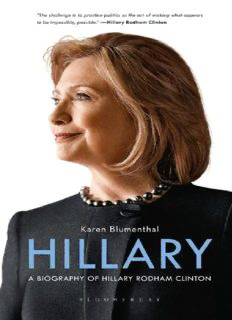
Hillary: A Biography of Hillary Rodham Clinton PDF
Preview Hillary: A Biography of Hillary Rodham Clinton
HILLARY A BIOGRAPHY OF HILLARY RODHAM CLINTON Karen Blumenthal To Abby During the blistering primary battles against U.S. Senator Barack Obama, Hillary drew an enthusiastic crowd in Fort Worth, Texas. CONTENTS Introduction Part One: Beginnings 1 Roots 2 Groundwork 3 Park Ridge 4 Wellesley 5 Making Possible 6 Yale 7 Bill 8 Courtship 9 Children 10 Nixon Part Two: Arkansas 11 Fayetteville 12 Lawyer 13 Governor 14 Comeback 15 Mom 16 Campaign 17 President Part Three: First Lady 18 Firsts 19 Saint Hillary 20 Whitewater 21 Pink 22 Eleanor Roosevelt 23 Subpoena 24 Reelection 25 Lewinsky 26 Impeachment 27 New York 28 Winner Part Four: Hillary 29 Senator 30 War 31 Candidate 32 2008 33 Secretary 34 MOTB 35 Benghazi 36 2016? Time Line Bibliography Notes Photo Credits Acknowledgments Index Also available Also by Karen Blumenthal A NOTE ON NAMES Generally, the subject of a biography is referred to by last name throughout. But keeping Hillary Rodham Clinton and Bill Clinton distinct from each other in a text is tricky because they share a surname. Adding titles is also messy: Mrs. or Ms.? President? Senator? Secretary? Too often, this challenge is resolved by calling a woman by her first name and a man by his last, but that is a poor solution that isn’t acceptable here. As a result, for simplicity and clarity, Hillary Rodham Clinton is called Hillary on second reference and Bill Clinton is called Bill. No disrespect is intended. INTRODUCTION In losing, Hillary Rodham Clinton gave perhaps the best speech of her life. For more than a year, she had debated, glad-handed, flown, phoned, conferenced, preached, pleaded, promised, speechified, scraped, and scrambled in her quest for the Democratic nomination for president of the United States. She had started out as the front-runner and then lost ground to a youthful and charismatic senator from Illinois—Barack Obama. She had won close to 18 million votes. But that wasn’t enough. Obama had finally clinched the nomination. On 7th June 2008, the former First Lady stood before a jam-packed audience to say thank you to her supporters and to endorse her opponent. “This isn’t exactly the party I’d planned,” she told them, “but I sure like the company.” She told the crowd that she had run “because I have an old-fashioned conviction that public service is about helping people solve their problems and live their dreams.” She counseled her supporters not to wonder “what if?” “Every moment wasted looking back keeps us from moving forward,” she said. “Life is too short, time is too precious, and the stakes are too high to dwell on what might have been.” And though she fell short of her goals, she urged her followers to pursue their own. “Always aim high, work hard, and care deeply about what you believe in,” she said. “And when you stumble, keep faith. And when you’re knocked down, get right back up, and never listen to anyone who says you can’t or shouldn’t go on.” Supporters from around the country fill the National Building Museum in Washington, D.C., for Hillary’s 2008 concession speech and final rally. Throughout her campaign, she had avoided talk about her historic role as the first woman in American history to win a binding primary and the first to come oh-so-close to the nomination. She would say that she was running as a candidate, not as a woman. But not today. “When we first started, people everywhere asked the same questions. Could a woman really serve as commander in chief?” she asked. “Well, I think we answered that one.” She acknowledged that women still face barriers and bias because of their sex. But she hoped that in future campaigns, no one would marvel at the idea that women could compete and win. “Although we weren’t able to shatter that highest, hardest glass ceiling this time,” she told them, “thanks to you, it’s got about eighteen million cracks in it.” Following that rough race, Hillary did something else: She turned a painful and very public loss into a win. Obama was so impressed with her intelligence, her toughness, and her tenacity that he sought her for secretary of state after he was elected president. It was a dramatic conversion—but not an unusual one. For much of her life,
Description: